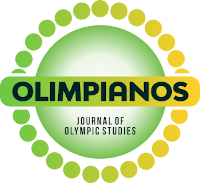Olympic Education and the Curricular Common National Base (BNCC): An approach between sport and education
DOI:
https://doi.org/10.30937/2526-6314.v2n3.id63Keywords:
Olympic education, BNCC, Curriculum, Sport, OlympismAbstract
Sport as a guiding thread in interpersonal relationships exposes significant values ​​and behaviors for a social group, reinforcing a cultural and personal identity. As such, it provides a context of educational potential and can be used as an instrument of ethical attitudes and values ​​necessary for social and individual life. In the conception of Olympism, which is a philosophy of life based on body, spirit and mind, Pierre de Coubertin believed that the approximation of sports manifestations with a heroic imagination would boost the insertion of sport as a pedagogical medium. In this way, Olympic Education becomes a path of great possibilities presenting the universe of the Olympic Movement: its history, its values ​​and its Olympic symbols. Valuing the pedagogical aspects of sport and deconstructing the image that sport is exclusionary. In turn, the Common National Curriculum Base (BNCC) favors the integral education of students with the construction of a fair, democratic and inclusive society, guided by ethical, aesthetic and political principles. Thus, the purpose of this paper is to approximate the principles of Olympic Education with the BNCC, in a proposal to mean sport and education. In conclusion, disseminating and discussing the significance of Olympic, sporting and humanitarian values ​​in the daily lives of actors in the school context has become fundamental for improving the quality of life of children, youth and the entire community.
References
1 Rubio K. O legado heroico do papel social do atleta. In: Dacosta L. Editor. Legados em megaeventos esportivos. BrasÃlia: Ministério do Esporte; 2008.
2 Rubio K. Esporte, educação e valores olÃmpicos. São Paulo: Casa do Psicólogo; 2009.
3 Futada FM. Educação OlÃmpica: Conceito e modelos. In: Rubio K. Editora. Educação olÃmpica e responsabilidade social. São Paulo: Casa do Psicólogo; 2007.
4 Silva TT. Documentos de identidade – Uma introdução à s teorias do currÃculo. Belo Horizonte: Autêntica; 2002.
5 Lenk H. Toward a social philosophy of the Olympics: Values, aims and reality of the modern Olympic movement. West Point, NY: Leisure Press; 1976.
6 Chatziefstathiou D. The changing nature of the ideology of Olympism in the modern Olympic era. Dissertação. London, Loughborough University; 2005.
7 Müller N. Olympic education: University lecture on the Olympics Barcelona. Internacional Chair in Olympism (IOC-UAB). Barcelona: Centre d´Estudies Olimpics (UAB); 2004.
8 Binder DL. Teaching Olympism in schools: Olympic Education as a focus on values education: university lectures on the Olympics. Internacional Chair in Olympism (IOC-UAB). Barcelona: Centre d´Estudies Olimpics (UAB); 2005.
9 Brownlee H. Global initiatives in Olympic Education. 39th Session: International Olympic Academy; 1999.
10 Kidd B. The Aspirations of Olympism: A framework for considering the athlete’s experience in the Olympic Movement at the close of the twentieth century. Internacional Chair in Olympism (IOC-UAB). Barcelona: Centre d’Estudis OlÃmpics (UAB); 2005.
11 Müller N. Olimpismo: Seleção de textos. In: Müller N, Todt NS. Editores. Porto Alegre: EdiPUCRS; 2015.
12 Morin E. Introdução ao pensamento complexo. Porto Alegre: Sulina; 2006.
13 Burnham TF. Complexidade, multirreferencialidade, subjetividade: Três referências polêmicas para a compreensão do curriculum escolar. Em Aberto. 1993; 12(58): 3-13.
14 Santos BS. Um discurso sobre as ciências. São Paulo: Cortez; 2008.
15 Machado NJ. Epistemologia e didática: As concepções de conhecimento e inteligência e a prática docente. São Paulo: Cortez; 1995.
16 Delors J, Chung F, Geremek B, Gorham W, Kornhauser A, Manley M, et al. Relatório para a UNESCO da Comissão Internacional sobre Educação para o século XXI. In: Educação: um tesouro a descobrir. São Paulo: Cortez; 1998.
17 Neira MG. Incoerências e inconsistências da BNCC de Educação FÃsica. Revista Brasileira de Ciências Do Esporte 2018; 40(3): 215–223.
18 Comitê OlÃmpico Internacional. Carta OlÃmpica. Lausanne: Comitê OlÃmpico Internacional; 2014.
19 Parry J. Physical education as Olympic education. European Physical Education Review. 1988; 4(2): 153-167.
20 Blum LA. Moral perception and particularaty. Cambridge, MA: Cambridge University Press; 1994.
21 Neira MG, Alviano Júnior W, Almeida DF. A primeira e segunda versões da BNCC: Construção, intenções e condicionantes. Eccos. 2016; 41: 17-31.
Downloads
Downloads
Published
Issue
Section
License
The authors authorize others to copy and redistribute the material in any medium or format. Remix, transform, and create from the material. You may not use the material for commercial purposes.






